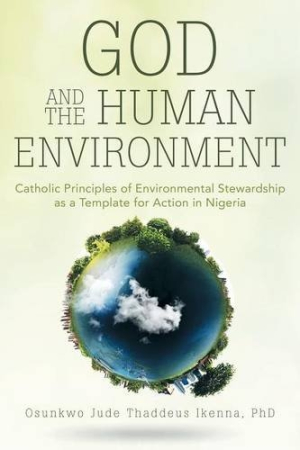God and the Human Environment
Catholic Principles of Environmental Stewardship as a Template for Action in Nigeria
God and the Human Environment is a hopeful call to action, with both a theoretical and practical side.
In a comprehensive look at the role religion plays in modern ecological questions, Osunkwo Jude Thaddeus Ikenna explores the philosophy behind environmental stewardship. God and the Human Environment is a heavily researched book that looks not only at the theological underpinnings of stewardship, but at a more specific case study of Nigeria and its challenges.
Ikenna begins with a discussion of recent church positions on environmental stewardship, citing sources such as documents from the Second Vatican Council and papers from Pope Benedict XVI. From there, he moves on to ask how local churches can help solve modern environmental challenges, and into a broader discussion of the philosophical assessment of man’s responsibilities to the sacred space he inhabits. The author’s analysis is deeply rooted in theology, with references to biblical passages and scholarship throughout.
Only about halfway through the book does Ikenna move into his specific case study, Nigeria. He assesses its current state, noting chemical and toxic wastes, poor management, and pollution, and their consequences. The section reads very differently from the earlier part of Ikenna’s book, and almost feels like a separate work. This quick change in gears makes it at times hard to relate the dense philosophy from the earlier portion to the case study examined. This also makes it difficult to determine the exact audience for the work, as it is unclear whom Ikenna is trying to reach: other members of the church, those interested in Nigerian environmental issues, or those interested in theological and philosophical reasoning. As such, the work may appeal to a very niche audience looking for the intersection of all three.
Otherwise, however, the organization of God and the Human Environment is strong and easy to follow. Breaks to delineate specific case studies and environmental consequences make for a digestible read. Ikenna’s passion is also evident throughout, as he encourages readers to “move away from the temptation to follow a culture of death which degrades the earth to satisfy human greed and which worships the false idol of mammon.” Instead, Ikenna argues that readers should seek to inject their ethical values into the debate, values that he has clearly explored and supported throughout this work.
God and the Human Environment is a hopeful call to action, with both a theoretical and practical side. It would appeal to those who have a specific interest in not only Catholic philosophy, but environmental issues and Nigeria’s specific challenges. Ikenna’s meticulous research and careful reasoning are evident throughout this book on a topic that has not yet been fully explored.
Reviewed by
Stephanie Bucklin
Disclosure: This article is not an endorsement, but a review. The publisher of this book provided free copies of the book and paid a small fee to have their book reviewed by a professional reviewer. Foreword Reviews and Clarion Reviews make no guarantee that the publisher will receive a positive review. Foreword Magazine, Inc. is disclosing this in accordance with the Federal Trade Commission’s 16 CFR, Part 255.

